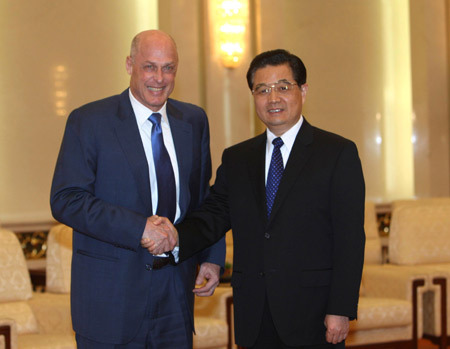Chinese President Hu Jintao said in Beijing on Wednesday that China and the United States, as important members of the global economic system, had a shared responsibility to safeguard the health, stability and development of the world economy.

Chinese President Hu Jintao meets with Henry M. Paulson, special representative of US President George W. Bush and the US Treasury Secretary, at the Great Hall of People in Beijing, April 2, 2008.
Hu made the remarks during a meeting with visiting US Treasury Secretary Henry M. Paulson in the Great Hall of the People.
Hu spoke positively of the recent growth of Sino-American economic and trade cooperation and bilateral relations, noting that the development of these ties served both nations' interests and promoted world peace and prosperity.
"China will join hands with the United States to boost exchanges and communication, expand strategic mutual trust and appropriately handle sensitive issues in an effort to step up bilateral constructive and cooperative relations", Hu told Paulson, according to a press release from the Foreign Ministry after the meeting.
Hu also hailed the bilateral Strategic Economic Dialogue (SED) as "a success" and stressed that the three consecutive dialogues had already played an important role in promoting ties. He said that China attached great importance to bilateral consultative mechanisms such as the SED.
China would intensify communication and coordination with the US on macroeconomic policies, continuously lift the level of bilateral economic and trade cooperation and make joint efforts with the United States to maintain the growth of the world economy and the stability of the international financial system, Hu said.
Paulson, who came to China as a special envoy of US President George W. Bush, briefed Hu about the latest developments in the US economy and his views on US-China trade relations.
"The SED has made and is making progress", Paulson said, highlighting the view that sound growth of both economies would yield mutual benefit.
Growth of overall bilateral ties was important to both sides, Paulson said, and he expressed the hope that the two nations would push forward the SED and other aspects of bilateral relations.
Paulson, who arrived in Beijing earlier on Wednesday for a two-day visit, was also scheduled to meet Premier Wen Jiabao and other senior officials.
Prior to his visit, Paulson told reporters he intended to visit China because of the change of leadership after China's 11th National People's Congress session. He said that he would meet with his counterparts, new leaders, and the president and premier to talk about the SED.
Launched in September 2006, the SED, a biannual economic strategic dialogue, serves as a platform to discuss long-term, strategic and comprehensive issues in the bilateral trade relationship.
(Xihhua News Agency April 3, 2008)